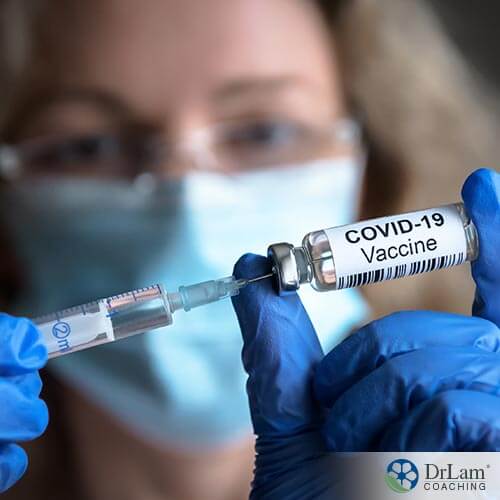 The COVID-19 pandemic has been confusing and heartbreaking for many people for many reasons. Our lives have changed. People have attached a lot of hope to the development and release of the COVID vaccine. Now, the rollout of these vaccines is underway. Several vaccines have already been approved by different regulatory bodies, and shipments are going out. But there are also some concerns about this fast release. Here’s what you need to know to keep you and your family safe.
The COVID-19 pandemic has been confusing and heartbreaking for many people for many reasons. Our lives have changed. People have attached a lot of hope to the development and release of the COVID vaccine. Now, the rollout of these vaccines is underway. Several vaccines have already been approved by different regulatory bodies, and shipments are going out. But there are also some concerns about this fast release. Here’s what you need to know to keep you and your family safe.
In the following sections, we deal with several significant areas of concern that many people have regarding whether to take one of the COVID-19 vaccines currently available. Information contained in the sections comes from the latest information from the Centers for Disease Control and Prevention.
The current CDC COVID vaccine updates clearly state that both the COVID vaccines, the Pfizer or Moderna vaccine, are safe and effective.
The update also states that the two types of vaccines should not be mixed in the two doses. In other words, if you receive the Pfizer vaccine for your first injection, you should not receive the Moderna vaccine for your second injection. Both doses of vaccine should come from the same product.
The CDC covid vaccine updates indicate the steps taken to assure this happens. These steps include:
However, in the rare case that something should happen before your second dose that makes the same product unavailable or if medical personnel can’t determine whether the product of your first dose was Moderna or Pfizer, then any mRNA COVID-19 vaccine can be administered after a minimum of 28 days. The efficacy of this method has not been studied, however.
South Africa has halted the use of their AstraZeneca-Oxford vaccine after a clinical trial showed that this vaccine did not protect against mild or moderate illness from the new highly contagious SARS-CoV-2 variant, B.1.351. This variant first emerged in South Africa.
However, the AstraZeneca-Oxford vaccine is authorized in the U.K. and found to be 75% efficacious against the B.1.1.7 variant and 84% effective against older variants.
In the U.S., Johnson & Johnson Janssen (J&J) has developed a single-dose COVID-19 vaccine, which has been approved for use in the U.S. by the FDA. It uses the adenovirus vector and not mRNA tech. The CDC notes this vaccine was found to be 66.3% effective in clinical trials.
However, there is some controversy over how effective both J&J and AstraZeneca are against later strains of the virus, particularly the Delta variant. While one study published by J&J researchers found that the J&J vaccine was only slightly less effective, and immunity grew over time, other researchers put its efficacy closer to 33% for the Delta variant. This is similar to research on AstraZeneca’s efficacy.
This variant, first found in the U.K., has doubled in growth rate in the US about every 1.5 weeks and is around 40% more transmissible than other previous lines. Even though this variant was first discovered in US patients in December 2020, it is likely to have arrived few weeks before that. By March 2021, this COVID-19 Variant B.1.17 was the dominant SARS-CoV-2 lineage across the United States. So far, most studies show that while vaccines may be slightly less effective against B.1.1.7, it is only by a small margin.
The Delta Variant is also known as lineage B.1.617.2. It was first detected in India in late 2020. The Delta Variant is estimated to be 40-80% more contagious than the Alpha strain, which was 50% more contagious than the original SARS-CoV-2 strain. Because it’s so easily transmitted, this strain has become the dominant one across India, the US, and the UK. By the end of July, 2021, it was responsible for more than 80% of new cases in the US.
Because this variant is so new, information is still coming in about the effectiveness of the vaccines against it. One study, published in the New England Journal of Medicine in July, 2021, focused on all the sequenced cases of COVID in England from the time the Delta Variant began circulating. Two doses of vaccine appeared to be only slightly less effective against symptomatic cases for Delta than Alpha. Pfizer was found to be 88% effective against Delta, while AstraZeneca was 67% effective.
What is clear at this stage is that the vaccines may be slightly less effective against the COVID variants, but they still provide protection against severe illness from the Delta strain.
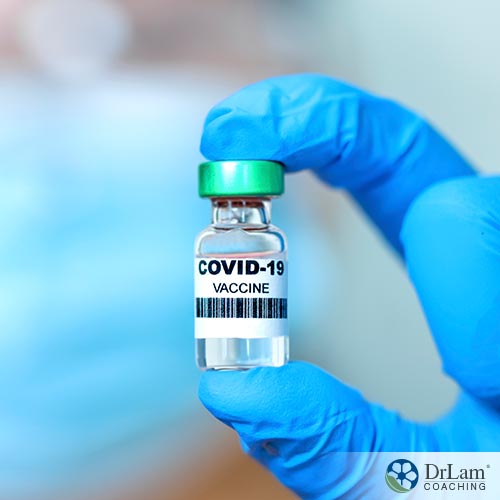 You should get the vaccine, even if you have already had the virus. This is because there is a high risk of reinfection. The COVID vaccine appears to develop stronger antibodies against reinfection than having had the virus alone.
You should get the vaccine, even if you have already had the virus. This is because there is a high risk of reinfection. The COVID vaccine appears to develop stronger antibodies against reinfection than having had the virus alone.
Current COVID vaccine updates say that whether you experienced symptoms or not makes no difference.
Also, current COVID vaccine updates do not recommend testing for either a current infection or prior infection as part of your decision-making process regarding vaccination.
If you are currently experiencing symptoms of the infection, you should wait until you recover before getting the vaccine. The same recommendation applies if you get the virus after your first dose but before the second dose.
There is no recommended minimum time interval between recovery from the infection and vaccination. Current studies show that you may be at low risk of reinfection for several months after getting COVID-19 and therefore you may choose to delay getting the vaccine for a few months, especially if supplies are low. However, keep in mind that your immunity will decline over those months. Unless there is a strong reason, it is probably a good idea to get vaccinated within a few months of your recovery.
Delay taking your vaccine if you've recently been exposed to the virus. The incubation period for the COVID-19 virus is 4-5 days. Current COVID vaccine updates show that this would not give the first dose of the vaccine enough time to produce an adequate immune response to the virus.
In addition, if you continue to quarantine at home and become exposed to the virus, wait until the recommended quarantine time elapses before taking the vaccine. Otherwise, you could be exposing healthcare workers and others to the virus.
If you live in a facility with other people, such as a long-term care facility, you are advised to get the vaccination. Exposure to the virus in these settings continues over a long period of time. The healthcare workers in those settings already work in close contact with residents. In other residential settings, for example, detention facilities or homeless shelters, residents should get vaccinated. This will prevent delays in curbing infection due to the increased risk of outbreaks in these kinds of settings.
Another of the COVID vaccine updates recommends you not take either of the COVID-19 vaccines with any other vaccine. The current guidelines suggest you should not get the COVID vaccine within 14 days of getting another vaccine and wait 14 days after the COVID vaccine to get any other.
In case of emergencies, if you do need another type of vaccine before the 14 days are up, for example, a tetanus injection due to a wound, then the CDC recommends going ahead with it. The same is true if getting the COVID-19 vaccine within the 14-day window of another vaccine is crucial due to urgent medical reasons.
In any situation of a widespread infection, whether the outbreak reaches the pandemic stage or not, patient counseling remains important. As the infection gains in strength, so does the need for accurate information.
Current COVID vaccine updates cover several things you may want to know before you go to get your shot.
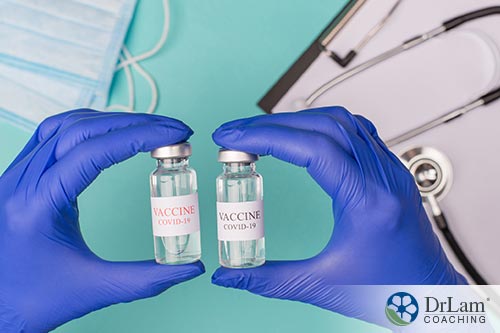 The data available for both the Moderna and Pfizer vaccines shows high efficacy after two doses, around 95%. The data for single-dose effectiveness is limited at this time, although it appears to be between 50 and 75% effective.
The data available for both the Moderna and Pfizer vaccines shows high efficacy after two doses, around 95%. The data for single-dose effectiveness is limited at this time, although it appears to be between 50 and 75% effective.
Research also shows that getting only one dose is less effective for the Alpha variant, and significantly less effective for the Delta variant. In order to make sure you get the optimum protection, it's important to get both doses of the vaccine.
Though not currently authorized in the US at the time of this writing, the AstraZeneca-Oxford vaccine is 74.5% effective against the Alpha variant of COVID-19.
The J&J vaccine uses an adenovirus vector and not mRNA tech. Recent results showed a 66% efficacy against moderate to severe COVID-19.
Some reaction is likely with any vaccine. With the COVID-19 vaccine, reported reactions typically involve local symptoms such as pain, swelling, and redness at the injection site. In addition, the lymph nodes under the arm in which you get the injection may become painful. Keep in mind this reaction is normal. In case it appears in a breast MRI or mammogram, it will most likely be benign and you might be asked to do a follow-up ultrasound within 6-8 weeks after the second vaccine dose.
Likewise, some people may experience symptoms like headaches, chills, fever, fatigue, and painful joints. Most of these symptoms will be mild to moderate and will resolve within the next three days.
In addition, these symptoms are more likely to occur following the second vaccine dose, and they are more common among younger people.
Whether or not you experience any symptoms of a reaction following the first dose of vaccine, current COVID vaccine updates say you should go ahead with the second dose of your vaccine. This will give you the optimum protection against the virus. Skipping the second dose leaves you open to infection.
Current COVID vaccine updates show the use of OTC medications for fever or pain may help with symptoms after vaccination. However, the CDC does NOT recommend using these medications to prevent such symptoms. Fever and pain are both signs of a robust immune response, which is what you want in order to create antibodies to counter future COVID infections. Letting the symptoms run their course is the best way to allow your immune system to do its job.
If you suffer from Adrenal Fatigue Syndrome (AFS), these side effects may increase in severity and duration due to your condition and sensitivity. You should report any side effects quickly to your healthcare professional.
Research has found that the AstraZeneca vaccine is connected with rare blood clots accompanied by low platelet counts. The risk of one of these clots is roughly 1 in 100,000 for people in their 40s, and 1 in 60,000 for people in their 30s. Again, this vaccine is not approved in the US.
The Johnson & Johnson Janssen vaccine has also been associated with these rare blood clots. The risk is highest for women between the ages of 18-49, and occurs in about 7 per one million women vaccinated. It is lower for other groups. While the risk is very low, if a different vaccine is available for women in this age range, it is preferred.
The J&J vaccine has also been associated with a possible, very small increase in the risk of Guillian-Barre syndrome. In July, 2021, there were 100 noted cases in the US out of 13 million vaccines administered, mostly in men over the age of 50.
In the clinical trials of both mRNA vaccines, Pfizer and Moderna, a very small proportion of participants experienced hypersensitivity reactions. They occurred in 0.63% of participants who received the Pfizer vaccine and 1.5% of those who received the Moderna vaccine.
Very few severe allergic reactions have occured in response to either the Pfizer or Moderna vaccination. However, if you get an allergic reaction to the first dose of the mRNA COVID vaccine or any immediate allergic reaction, you may be asked not to take the second dose. It is critical to talk to a doctor or allergist-immunologist who knows your medical history in this case.
The CDC clarifies that the mRNA vaccines are contraindicated if you are allergic to polysorbate or polyethylene glycol (PEG). The J&J vaccine is contraindicated if you are allergic to polysorbate.
Also, if you have AFS then you should be careful to check for any reactions to the vaccine.
At this time, we still don't know if you can transmit the virus to others after you have been vaccinated. However, it is possible to get infected with COVID after being vaccinated because the vaccines do not provide 100% protection. They do protect against severe COVID infection that is more likely to lead to hospitalization or death. But, especially with the Delta variant, it is more likely for vaccinated people to get a mild or asymptomatic COVID infection that is possible to transmit.
This is why, for now, the CDC advises that even after getting both the vaccine doses, you should continue to follow social distancing guidelines to prevent exposure to the virus.
Wear a mask, wash your hands, avoid crowds, and maintain six feet between you and others. In addition, you should follow recommendations regarding travel, quarantine procedures if you experience exposure, and follow any guidelines your workplace or school may put in place.
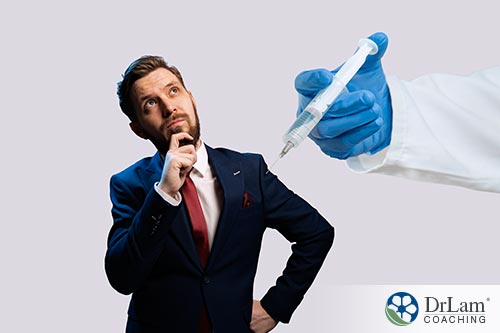 As with every medication or vaccine, there are some contraindications and precautions for the COVID-19 vaccines. The following information may change regarding contraindications and precautions as more data becomes available.
As with every medication or vaccine, there are some contraindications and precautions for the COVID-19 vaccines. The following information may change regarding contraindications and precautions as more data becomes available.
If your medical history includes any of the following, you should not get either of the mRNA COVID-19 vaccines or J&J vaccine:
Note that the mRNA vaccines, Pfizer and Moderna, contain PEG. The J&J vaccine contains polysorbate. If you are allergic to one type of vaccine, you may be able to get the other. However, PEG and polysorbate have a similar structure, so cross-reactivity is a possibility.
If you experienced either allergic reaction involving PEG or polysorbate, you should not get the COVID-19 vaccine until cleared by an allergist-immunologist.
According to the COVID vaccine updates, the CDC says that if you are allergic to injections other than those mentioned in the contraindications, then you may be at risk of a hypersensitivity reaction to either of the mRNA COVID-19 vaccines.
If you fall into this category, you should balance the risk of the allergic reaction against the benefits of the vaccination. You may consider deferring vaccination until you consult with an allergist-immunologist.
In addition, people who suffer from conditions that affect their immune systems or who undergo treatments that change their immune systems should consult their healthcare professional before getting the vaccine.
There may also be a slightly increased risk of a rare clotting disorder in women between the ages of 18-49 who get the J&J vaccine. Recent research puts the risk of this disorder at 7 per 1,000,000 doses of J&J vaccine for women 18-49. Anyone with a history of an episode of an immune-mediated syndrome characterized by thrombosis and thrombocytopenia in the last 90 days should try to get an mRNA type of vaccine instead of the J&J vaccine.
If you experienced an allergic reaction, even a severe allergic reaction, to other vaccines, injections, allergies to foods, venoms, pets, or something in the environment, or allergies to oral medications, these do not necessarily fall into the categories of either precaution or contraindications for either COVID-19 vaccine.
COVID-19 vaccines are safe for people who are allergic to latex, eggs, or gelatin. The stoppers in the vials containing either vaccine do not contain natural rubber latex, and the vaccines do not contain eggs or gelatin.
The following information regarding potential characteristics of an allergic reaction to either COVID-19 vaccine may not include all possible characteristics. A person who is having an allergic reaction may not experience all of these signs and symptoms.
According to current COVID vaccine updates, most of these reactions occur within 15-30 minutes after the injection.
Some symptoms include:
If you experience this kind of reaction, the CDC recommends you do NOT get the second dose of either vaccine.
This type of reaction is not an allergic reaction and typically occurs within 15 minutes of the injection according to current COVID vaccine updates.
Symptoms of a vasovagal reaction include:
If you experience these symptoms, the CDC recommends that you DO get the second dose of vaccine.
While these side effects can occur anywhere from 1 to 3 days after injection, most of them occur the day after the injection.
Systemic and local side effects include:
If you experience any of these symptoms, the CDC recommends you DO get the second dose of vaccine.
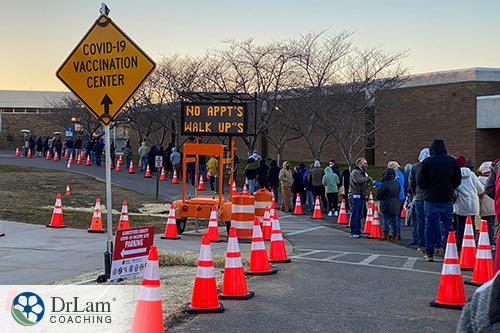 A lot of myths concerning the COVID-19 vaccines are circulating. The following will address a few of them.
A lot of myths concerning the COVID-19 vaccines are circulating. The following will address a few of them.
Both of the COVID-19 vaccines potentially can cause some minor reactions, especially after the second dose. Severe reactions rarely occur. Your chances of getting some kind of reaction remain moderate, but most of these reactions fall into the mild range and resolve quickly.
Claims that a lot of people get sick from the vaccine or that officials hide side effects and reactions or that long-term risks remain hidden simply are not true. Thousands of people who get the vaccine keep track of side effects and reactions. The data keeps on coming in daily.
Some people who do get sick after taking the vaccination may become sick due to other infections from people in their families. Likewise, they may become exposed to the virus in the few days before their vaccination and the symptoms show up after the vaccination.
These are reasons for continuing to follow the social distancing guidelines even after getting the vaccine.
Some people fear that the vaccines contain microchips, stem cells, fetal tissue, tracking devices, live coronavirus cells, aluminum, mercury, the Mark of the Beast, pork products, or preservatives. As of current COVID vaccine updates, none of the vaccines contain any of these.
The current COVID vaccine updates say that although the virus continues to mutate, the vaccines teach the body to recognize the virus based on several parts of it. At this point, the three vaccines authorized in the US are highly effective on the variants of the virus. Scientists continue to study the variants to make sure the vaccines help your body to recognize the virus.
There are numerous myths going around about the COVID vaccines at the moment. These myths not only have no scientific evidence backing them, but they can also cause panic, mistrust, and poor decision-making.
Here are some COVID myths you shouldn’t listen to:
Vaccine shedding occurs when the virus components are released in or outside of the body. However, this isn’t possible with the current approved COVID vaccines. The mRNA vaccines on the market do not contain the live virus. The J&J vaccine does contain a live virus, but it is adenovirus, not coronavirus, and it is unable to replicate. This makes vaccine shedding impossible.
The COVID vaccines do not contain metal and so can’t magnetize your arm or any other parts of your body.
The COVID vaccines are completely safe to take if you want to have a baby one day. There is no evidence that the vaccine impacts fertility or fetal development at any stage.
The vaccine also doesn’t affect the female menstrual cycle in any way. If you notice interruptions or changes in your cycle, it’s probably due to other causes like infections, stress, or changes in your diet, sleeping, or exercise routines.
None of the vaccines available at the moment contain the live COVID virus. Instead, they’re designed to teach your immune system to recognize and fight the COVID virus. This means you cannot catch COVID from the vaccines or return a positive result for the virus because of the vaccine.
If you experience COVID symptoms after getting the virus it may be because you were exposed before getting vaccinated. You may also experience a fever or soreness around the site as your immune system reacts to the vaccine. This is completely normal, and it’s what is supposed to occur.
The COVID vaccine doesn’t interact with your DNA at all. The vaccines deliver instructions to the cells that help them build proteins to protect against the COVID virus. However, human DNA is located in the cell’s nucleus or center, which the vaccine doesn’t penetrate.
In order to understand the COVID vaccine, you need to understand how vaccines work overall. Basically, vaccines teach your body how to fight off a harmful pathogen by exposing your body to antigens. Antigens are foreign substances that cause an immune response in the body. Vaccines contain weak or inactive parts of an antigen or a blueprint for producing these antigens.
You won't suddenly get sick with the disease when these weak antigens enter your system. Instead, they will prompt your immune system to react as if you’ve been exposed to the disease. In this way, your body learns how to react when it encounters that pathogen for real. So basically, your body remembers the diseases you’re vaccinated against and can more easily fight them off when you’re exposed in the future.
There are several Covid vaccines. Each vaccine is a little different and will have different effects on the body. Some of the variations include:
Many of these vaccines will contain other elements that make them more stable or effective. However, there’s no evidence at this stage that these ingredients can cause harm in such low levels.
Most of the vaccines under development at this time need two shots. There is only one vaccine in this group that only needs one to be effective.
There’s no way to say precisely how long the immunity will last from the COVID vaccine. This is the same as with any infection or vaccination, it all depends on the disease and on your body. However, some early evidence suggests that immunity may not last long with COVID-19. This is why medical researchers are suggesting that everyone gets immunized, even people who have had COVID-19 and recovered. This will give the greatest chance of lasting protection.
More data is needed to answer this issue, and that will only come as the vaccination is released and the results of it compiled.
The first vaccines were released in December 2020. The federal government is in charge of ordering and distributing the vaccines. These vaccines will be distributed by a range of providers including:
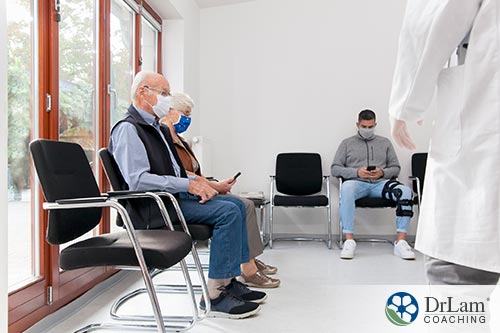
However, there are not enough doses available to immunize everyone right away. It will take time to produce enough vaccines in the needed quantities.
As a result, certain segments of the population will receive priority vaccinations. The first people to be vaccinated will be:
Individual lives and the world as a whole have been devastated by COVID-19 and the efforts to keep it under control. The COVID vaccine could help in the following ways:
Many researchers hope that herd immunity will help stop the spread of the virus. Once enough people have had the disease, or have been immunized, the virus will struggle to find viable hosts to infect and may die out.
It’s unlikely that the COVID vaccine will prevent everyone from getting infected with COVID-19 after exposure. Vaccines don’t prevent infection; they teach the body how to fight the infection. So, you may still get COVID-19.
However, the important thing is that the symptoms should be a lot milder than they would have been if you weren’t vaccinated. This should significantly lower the virus’s mortality rate.
One of the most serious and heartbreaking effects of COVID-19 in hard hit areas is the pressure on the health system. Even in the US, the health system just isn’t set up to cope with a massive influx of patients who need intensive care. As has been seen in other countries, this has led to stressed medical staff, a lack of medical facilities, and patients being turned away from hospitals. And the situation only gets worse as medical staff start falling victim to the virus.
Vaccinations could help lower the mortality rate and ensure that vaccinated people don’t get seriously ill. This will lower the pressure on the health system overall.
COVID-19 has devastated the economic systems of many countries. A working vaccine and a vaccinated population will help turn that around.
This doesn’t mean that you must get vaccinated. This is a highly individual decision that should be made on your physical and medical condition alone.
There’s a lot of information running around about vaccines and the COVID vaccine in particular. First and foremost, despite claims, no vaccine available today gives you a disease. They’re designed to teach your body how to fight the disease, and anyone who says otherwise is misinformed.
The safety of vaccinations is the first and most important concern when it comes to creating a vaccine. That’s why researchers start small, with research on cells and animals, before moving on to human studies with volunteers. This process is intensive and helps to ensure the safety of vaccines. And despite the fast pace of COVID-19 research, researchers still aren’t skipping any of these stages.
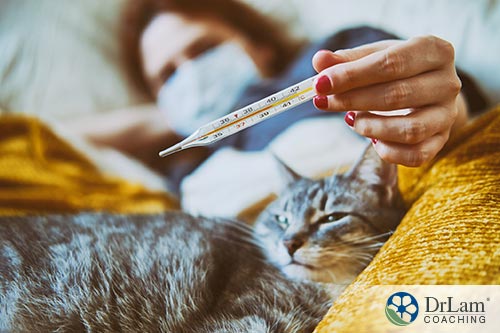 Some people do get sick after getting vaccinated, but this isn’t because of the disease. When you’re vaccinated, your body reacts to the vaccine. That’s why some people experience mild symptoms such as:
Some people do get sick after getting vaccinated, but this isn’t because of the disease. When you’re vaccinated, your body reacts to the vaccine. That’s why some people experience mild symptoms such as:
These symptoms are usually mild and go away within a day or two. At this stage, researchers working on the COVID vaccine haven’t identified any serious adverse effects. Allergic reactions to vaccines are rare.
When you have advanced Adrenal Fatigue Syndrome (AFS), almost any foreign substance can be harmful to your body. This is because of imbalances in the NeuroEndoMetabolic (NEM) Stress Response. This is the system that activates during stressful times to give you the energy and the strength to get through the stress.
When the NEM stress response is active over a long period, it becomes unbalanced and unhealthy. The adrenal glands start to fatigue and struggle to produce the cortisol that the NEM stress response demands and the body needs to respond to the stress. If this situation isn’t corrected, it can lead to widespread system imbalances and problems.
If you have adrenal fatigue, you may find yourself reacting badly to vaccines because of imbalances in the circuits and overall poor health. That’s why you need to talk about the vaccine with an AFS aware doctor beforehand.
However, it’s also worth mentioning that you’re more prone to infections and may struggle to get rid of them when you have AFS. This may put you at higher risk of catching and experiencing more adverse effects from COVID-19. It may also mean that you get sicker than most people do, or experience some of the longer-term consequences of this virus. This should be another serious consideration when you’re deciding whether to get vaccinated.
Most of the issues you may experience surrounding COVID-19 and the vaccine when you have AFS has to do with the Inflammation circuit.
The Inflammation circuit is your body’s best defense against infections and pathogens. Unfortunately, it becomes unbalanced in AFS due to dysfunctions in the circuit as a whole and in the three components. The Inflammation circuit is made up of the gut, the immune system, and the microbiome. These components work together and separately to perform their individual functions and keep the body healthy.
When this circuit becomes unbalanced, you will probably experience widespread chronic inflammation and increased susceptibility to infections. You may also experience gut problems like constipation or diarrhea, and imbalances in the balance of bacteria in your body, resulting in a leaky gut and other issues.
Any vaccine may exacerbate these types of problems in the following ways:
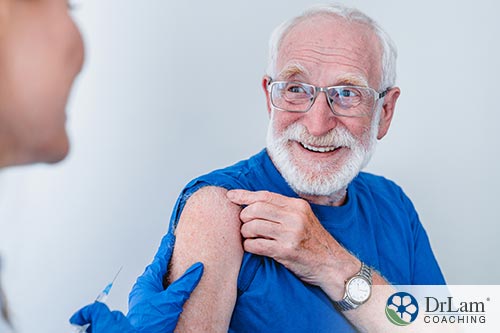 This is a highly individual decision and should not be made lightly, especially if you experience other serious medical issues. Talk to your doctor first and get their expert advice. They will be able to help you weigh the risks and benefits of getting the COVID vaccine and help you make the decision that’s right for you.
This is a highly individual decision and should not be made lightly, especially if you experience other serious medical issues. Talk to your doctor first and get their expert advice. They will be able to help you weigh the risks and benefits of getting the COVID vaccine and help you make the decision that’s right for you.
If you have AFS, you’ll need to speak to a doctor who’s aware of this condition, because you may be more prone to paradoxical reactions and heightened sensitivities. This is the best way to make a decision that’s safe for you and for the world at large.
Remember: medical issues and AFS could also make you more vulnerable to becoming seriously ill with COVID-19 itself - something that getting vaccinated could help prevent. This is why it is so important to weigh the risks and benefits with a doctor you trust.
The new COVID vaccine could be a valuable weapon in the world’s fight against the coronavirus. But there are several things you should know to keep yourself safe. This is even more important if you have AFS or another serious condition that could increase the chances of a negative reaction to the vaccine.
For more information on how this vaccine could affect your health, give us a call at +1 (626) 571-1234 or click here for our Ask The Doctor system.
The last few months have been difficult for a lot of people. But there’s now light on the horizon with new covid vaccine getting a lot of attention. If you’re concerned about this vaccine, then talk to your doctor about whether it’s safe for you.
